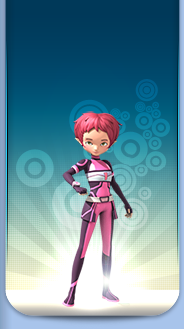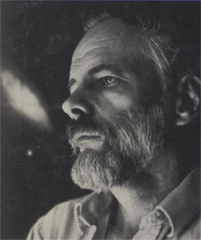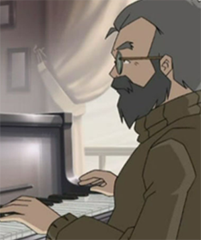
|
 |
Philip K. (Kindred) Dick
| | | If you read the file on the places within Kadic, you learned that the name of the school is nothing other than an homage to this American science-fiction author. To explain briefly before diving into this analysis, I will cite Wikipedia.
“Philip Kindred Dick (December 16, 1928 – March 2, 1982) was an American novelist, short story writer and essayist whose published work is almost entirely in the science fiction genre.”
The news of the link between the name of the school of the heroes and this author (Kadic & K. Dick) isn't recent. On my part, I received a second confirmation from Jérôme Mouscadet during the season 4 advance-premier on July 5th, 2007.
This link has unfortunately never been, or at least not to my knowledge, expanded upon in France, and so, CodeLyoko.Fr will mention several links to you, since the idea here is to compare this worried and tormented character to Franz Hopper to that of Philip K. Dick.
First off, let's use the power of visuals!
 
Several resemblances are clear.
Now let's get straight to the facts. I must clarify certain points on the life of Philip K. Dick throughout this file. | | |
|  | Although this point isn't made in advance in the series so as not to upset the youngest of viewers, Franz Hopper is by all evidence a hurt man by the loss of his wife who left him with a great scar. The presence of three scanners in the basement of the factory leaves us to think that he would have wished to bring his dear wife Anthea along with him and Aelita.
So, like Lyoko, the life of Franz Hopper felt a loss and an incomplete sentiment. This is a personal opinion, however, I believe that if Hopper had finished with Lyoko, he would still have had a feeling of frustration from the fact that his wife could have never discovered his great work.
Now to the real world.
The following fact seems to have become a cliché and yet, it's a piece of truth from the life of Philip K. Dick: The man had a young sister who died a month and 10 days after their birth. This fact clearly marked the writer in his life and his work.
The author and his work, after Wikipedia, (I insist on the fact that to pretend to know a man from an Internet article is a heresy, especially a man as complex as him, so let's handle this gently) would have still had a “missing part”, that would pervade some of his novels. This is also a link to Hopper.
I prefer to compare the wife of the one to the sister of the other, since the love life of K. Dick was never stable.
I will also get back to the fact that the parents of the writer separated when he turned 4 and the father broke off all ties with the family. Dick was upset by this all through his life and in this way, he is more comparable to Aelita who seems to eternally miss her father. |  | |
|  | Franz first.
I surely don't need to remind you of the unmissable episode 52 of the series. We discover one of Hopper's sides within it: the one of a tormented man, part megalomaniac and part paranoid.
Remember the parts from his diary, seen by Jeremy... The “great project”, “someone is spying on me”, “they want to eliminate me”... Aelita's flashback from the same episode and episodes 57 and 82 reassure us while showing us at which time this father loved his daughter, Franz (or Waldo if you prefer) still remains a troubling character...
Philip next.
The plot influences his work just as much as his life.
Firstly, in his love life...
The author married for the second time in June of 1950 to Kleo Apostolides, of Greek origin, a minor leftist activist, filed by the FBI due to accusations of communism. Keep in mind that the Cold War was indeed in full swing and that the hunt for communists was virulent in the USA at the time (as was McCarthyism.)
So, two FBI agents went to demand that Dick investigate his own wife, which the author refused! But the FBI agents were far from being the men in black.
Dick ended up divorcing his second wife and marrying Anne Williams Rubinstein. After a romantic start and a daughter (a little Aelita?), he fell back into paranoia: he suspected his wife of wanting to kill him! I quote:
“She was a psychotic murderer. She scared me, and twice she tried to kill me.”
From a political point of view...
Indeed, the first novels by Dick were very politically tainted. Even if there was never any proof of any political activity on the side of Dick, I will allow myself to draw a parallel with the Carthage project in which Hopper was involved.
Dick developed a rather strong sense of paranoia. He maintained that he wasn't successful, because people would gang up on him and provoke him!
He even “drugged himself up” with pills and became depressed sometimes.
Is it right to compare amphetamines to the dependence Hopper had on his machine and his returns to the past? I will let you decide!
After a time of success during the 60's, the home of K. Dick was burglarized and several affaires were hidden. I am going out of my way to highlight to you this fact, because you have probably already made the connection with the state in which Aelita and Jeremy discover the Hermitage, rummaged through by the men in black.
Dick suspected once again that the FBI wanted to try to take his life. The rest of his life was not so glorious, split between writing, suicidal tendencies and attempts to seduce young women...
Nonetheless, the author put to work an idea that I will explain to you in part D). |  | |
|  | Our articles give you all the necessary information to know that the technology of the series is ahead of our time. As is commonly agreed, Franz Hopper is a genius.
What is genius is, however, difficult to define, and I won't get carried away by saying that K. Dick is one. And yet... the man, despite the flaws of his literary style, is a great writer, who like many people ahead of the mentality of their time (Copernicus to name a big one) and known after their death (Henri Rousseau to name a talented and little known artist), Philip came to know his greatest success at the end of his life and his work became treasured.
In 1960, the post-war boom and economic prosperity were at their height. People were not in the mood for suspicion. Science-fiction was no longer or not at the time the fad. Despite that, Dick was able to write Matrix, which would have flopped. The idea of the confrontation between man and machine is actually what one could consider of a golden age... Cartoon (Code Lyoko), film (Matrix), book (The Android), futurism (Star Wars and Obiwan's quote in Episode II), manga (Akira), etc... starting during the 80s, not during the 60s/70s...
I'll add that these contemporaries find their scientific concepts to be foreign, out there and a bit incomprehensible. In 1960, it was too early for the word “computer” to really be used, nevertheless, I'll compare the groundbreaking genius of Hopper to the one of K. Dick who was not well-known to the people of his time. The author was born 20 years too early...
And yet... Looked at from anew, the character is full of ambiguity. When, in 1962, The Man in the High Castle is published, it was a success. But, K. Dick was not happy. He didn't want to be a part of the urbane world or thrive on his reputation. He wanted to be known for science-fiction and had a falling out even with his third wife. (Ah yes, I forgot to mention that he had changed in the meantime)... |  | |
|  | In the most somber year of his life, towards the end, K. Dick became persuaded that our world is fictional and that a superior reality exists.
He imagined that extra-terrestrials had entered in contact with him. He became interested in scientology and claimed to have divine revelations.
Here the roles are rather opposite.
Indeed, Lyoko, the work of Hopper, wasn't aiming to be a superior reality to Earth. However, it becomes an ideal escape. The very essence of Lyoko is to allow its creator to flee the Earth and his troubles.
Let's take note that one of K. Dick's novels sets up a world where humans emigrate to Mars (Do Androids Dream of Electric Sheep?). Are these the models of our Lyoko Warriors? Whether we want it to be so or not, Lyoko isn't the Earth and its pioneers are thus foreign visitors.
Additionally, in this work, K. Dick talks of a recurrent theme in science-fiction: the opposition between man and machine.
Even if he hoped of another world, the writer shows us that man might not be worth more than machine...
And on this point, although straying away from the moral of Code Lyoko, Dick again comes close to the character of Hopper who wished to become a computer program for life and who also programmed XANA to destroy Project Carthage and so repaired his human errors. |  | |
|  | Whether planned or not by the scriptwriters, the influence of K. Dick on Code Lyoko isn't limited to the homage given to this man by the name of Kadic Academy.
The character of Franz Hopper possesses various characteristics that make him close to the deceased Philip K. Dick and who reminds us that, even though meant for a young public at its core, Code Lyoko is comprised equally of significant cultural traces. |  | |
|
 |















